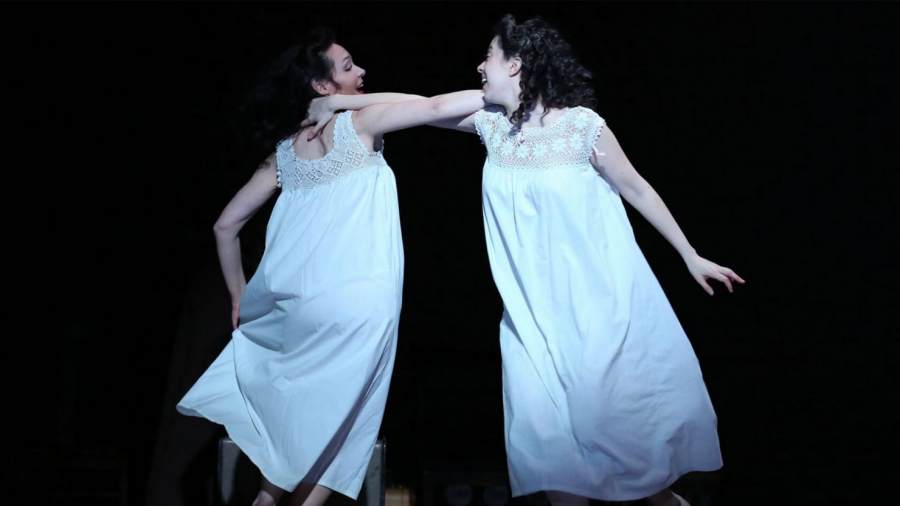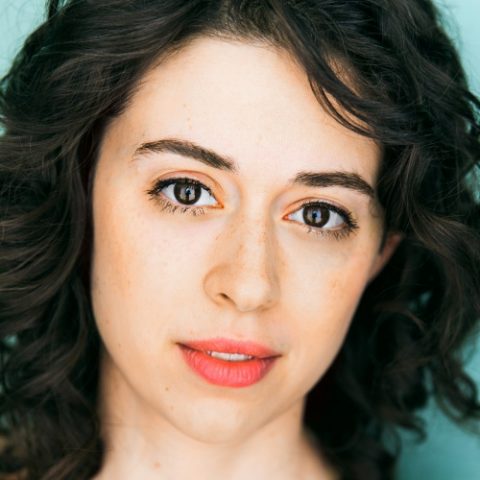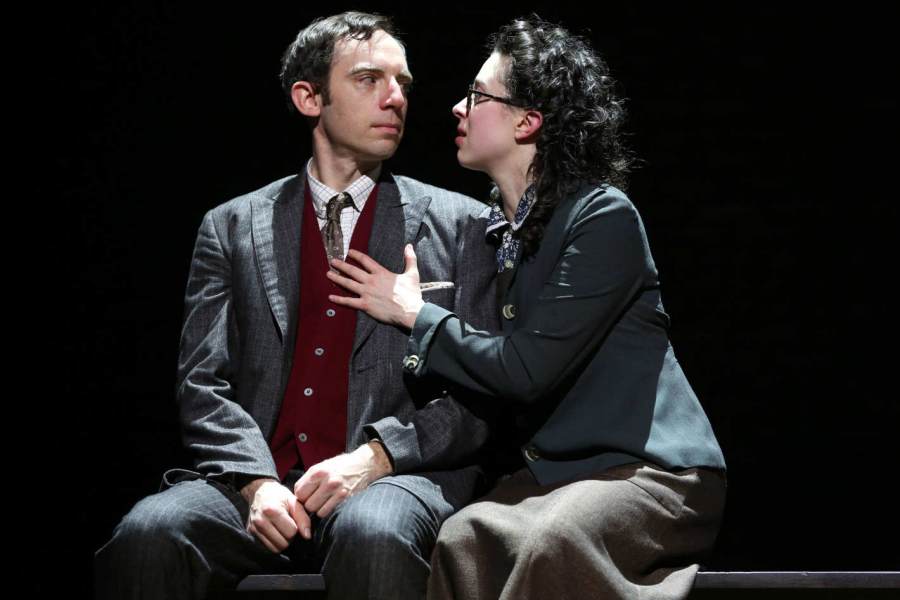

Indecent, written by Paula Vogel, directed by Rebecca Taichman, and currently playing at Broadway’s Cort Theatre, is inspired by the true story of the 1923 Broadway debut of Sholem Asch’s play God of Vengeance. Although originally set to close on June 25th, after an outpouring of support from devoted fans, the decision was made to extend the run through August 6th. We chatted with Adina Verson, whose poignant and nuanced performance as a member of the acting troupe brings the audience to its feet every night.
I think that one of the really interesting things about Indecent is that you've been developing it for so long. What’s it like to work on a piece for that long?
Adina Verson: It's pretty incredible. I've never been able to work with the same people on the same piece for that long, I feel like that's very un-American. The depth to which you can dive into something is pretty remarkably bottomless. And this group of people is so collaborative, and we're all game. I mean, we all got real cranky at certain parts during the process, as would I think any human being, but it was really incredible, the generosity and the questions, and just the work that we were able to be really open with each other about, and to have it be led by somebody who is such a visionary like Rebecca Taichman, and to have Paula, the way that she wrote was so collaborative. We would work on something and she would see that maybe she wanted to change something. And so she would go away, write pages and come back. And it was like Christmas, or Hanukkah rather, every three days. Because she would come back, and the stage management, you would see them at the printer and all of this stuff would be printing, and we were like, "Oh, we've got new pages." And then we would all sit around and read them, and then figure out how to stage it. And that was really collaborative with Rebecca and every cast member, and David [Dorfman], our choreographer. It's just so cool to just keep deep diving.
I bet. Has it been the same cast and creative team throughout the entire process since the beginning?
It has been, which is unheard of. We were off-Broadway and we were all recasting it with famous people in our heads. We had the cast ready to go. We were like, Mandy Patinkin's going to take over Tom Nelis’s part, and Jason Biggs is going to take over Max (Gordon Moore’s), and Lea Michele's going to take over my part.
 I’m so glad they didn’t! Has the piece evolved and changed a lot over the different iterations?
I’m so glad they didn’t! Has the piece evolved and changed a lot over the different iterations?
It has, and it's interesting because my family has seen it in every iteration and they can't tell exactly what changed, but the feeling of it has changed to them.
Interesting.
But yeah, a lot of musical numbers have come and gone. A lot of figuring out what needs to be told in certain storylines. Paula has rewritten the Mr. And Mrs. Asch storyline a number of times as she was trying to figure out why he didn't testify, because that's actually unknown, so she was trying to figure it out through research and talking to the family, etc. So that was rewritten quite a bit. Originally, the order of things was different. So there have been a lot of changes. And then also, the times have changed and so it's become more relevant as we've been doing it over the past two years, which is wonderful and terrible.
For people reading this who haven't seen it, without giving anything away, how would you say that the play is relevant to the times and the climate that we're facing today?
I think that the place that the Jewish community was in at the beginning of the 20th century is almost exactly where the Muslim community finds themselves today, which is kind of staggeringly upsetting. Anti-Semitism back then is so similar now, but also different sects of the same religion kind of turning against each other. Immigration policies tie into that, and that's really prevalent in our play. And also on a different level, freedom of speech and truth, I think, are themes in our play, and the freedom to express oneself which, I think, many of us feel are at risk right now with our current administration.
The following is a two part question. The first part is, how did you prepare in general at the beginning of every production of Indecent? And then also, how do you prepare every night? Because it's such a dynamic and I assume also an emotionally exhausting thing to do every night.
Yes. True. That is the truth. I guess when we first did it at Yale, I think that because I play so may different roles that I have to find them kind of from the outside-in. That's kind of the actor that I am. So I worked a lot on their energies, and their physicalities, and their voices, and trying to understand what their objectives are in a very broad sense. And as scenes are being rewritten, those kind of changed and morphed, and more information was given. So I felt that when we first did the show at Yale that, at least speaking for myself, I felt like all my characters were kind of caricature-y. They were kind of two-dimensional in a way. Because we had four weeks of rehearsal and it's a lot; this play is a lot. And so it was such a gift then to be able to go through three more rehearsal processes, and just learning more and more and more about these characters and about their relationships; and being able to be with Max Moore and Katrina Lenk, my main scene partners, as all of our characters evolved, as our relationships evolved, and our relationships outside of the play evolved, which set into our relationships onstage.
There's so much history at this point. Even with scenes that existed and don't exist anymore, that history still exists in our characters. And so I just feel like there's such depth to it; that there's even things I don't even remember but they just exist in the characters now.
As far as how to prepare for each night, it was really scary when we first did this because you feel...I feel out of control. Because it's not like I can prepare for my one character and then get onstage. Every scene in this play kind of drops into the middle of something, and there's no preparation time because you're in the scene previous, like we never leave the stage. And so, there's a lot of fear of being "I can't control this," and "what if I'm not feeling 'blank'" or "how do I use these bars of music when they're moving a table to drop into this other character?" And the way that the play is written, the more we've done it, the more I can trust the play and just be like, “all I can do is be emotionally available,” which is up to me, in a warmup and meditation, and et cetera -- however I, as an actor, need to prepare to be emotionally available and physically available and vocally available.
And then all I do is ride the play. It really feels like once we start, we're jumping out of an airplane and then we land at curtain call. It's been a huge, huge lesson for me in letting go and trusting my cast mates, and trusting the play, and trusting all the work that I've done previous to this, and trusting all the knowledge that I've gained from all of the teachers I've ever had. It's like a trust fall.

I'm sure. And your cast has been working together for such a long time. What's it like to do the same scenes over and over again with these scene partners who you've been working with and developing this with for years?
It's pretty incredible. This group of people. Sometimes you do a show, and somebody says something the exact same way every time. And if you say something different, they still react in the exact same way to what you did the night before. And I feel like because we've worked together so long, as a company we've built a really strong foundation and riverbed, and we're able to flow through it differently every night. And even now, our cast is so curious we'll be like, "What if we did this instead?" or "I heard this differently tonight. What do you think about that?" And also because we flow in and out of characters, there are moments when I'm playing, let's say Reina, and talking to Lou, the Stage Manager. But then a second later, I am just Adina onstage and he is Rich Topel onstage, and we smile at each other, and that feeds the next scene somehow. And it's sort of cool to be characters with each other onstage, but then also be friends with each other onstage. And there's a lot of laughing and giggling and looks and love that occurs onstage during the show.
That sounds like such a gift.
It is such a gift. It is such a gift.
So, what happened with your show almost closing and then being extended is so crazy, and I'm curious what that was like from your end and the cast’s perspective.
I think we're all kind of calling it "emotional whiplash." I mean, when you've worked on something for so long, and then you're told... Like, we all kind of thought that if we don't win the Tony for best play, we're probably going to close. Our show is not like a big, Broadway musical that's going to run for years, and we all knew that going into it. So we won a couple of Tonys, but we didn't win best play. And so when we got called in for a meeting with the producers the Tuesday after the Tonys, we all kind of knew what was going on. And I think we all had to emotionally prepare for that and start auditioning for our next job, and find the peace in saying goodbye to the show that we'd been working on for two years. And I think we all did that pretty well. And then, to be like, "Ha, ha! Just kidding!" I've never felt so many feelings before. And it was difficult because we had set ourselves up for closing and found the positives in it. And so then to be yanked the other way, it was just like... I was like, "Of course, with this play, this play that I have no control over, that I just have to ride along with. Of course this would happen, and I'm just riding along again." So it's been a huge gift. I'm truly amazed at the audiences that come every night. Like, the fact that people come every night, so many people. I'm just kind of amazed in general that our theater community and infrastructure that has been build over hundreds of years in this city, but it's so generous and incredible to be a part of. So it's been a huge gift to be able to continue to having audiences come every night.
That is really amazing. To finish off our interview, and you’ve touched on this a bit already, but what do you think that Indecent leaves people with? Why should people come and see it?
I think that it is a masterpiece in empathy. I mean, I think there are so many themes that this play's about and so many themes that it touches on, and depending on who you are and where you are in your life, and where you come from, it'll get you in a different sort of way. But I think that the overall theme is empathy. And I think that all theater, at the end of the day, will hopefully allow the audiences to empathize with their fellow human beings. And so I think that that's... we like to say that Indecent is a love story about a lot of different things. But I think that love is the gateway to empathy, and I think that that's, to me, the most important value in living.